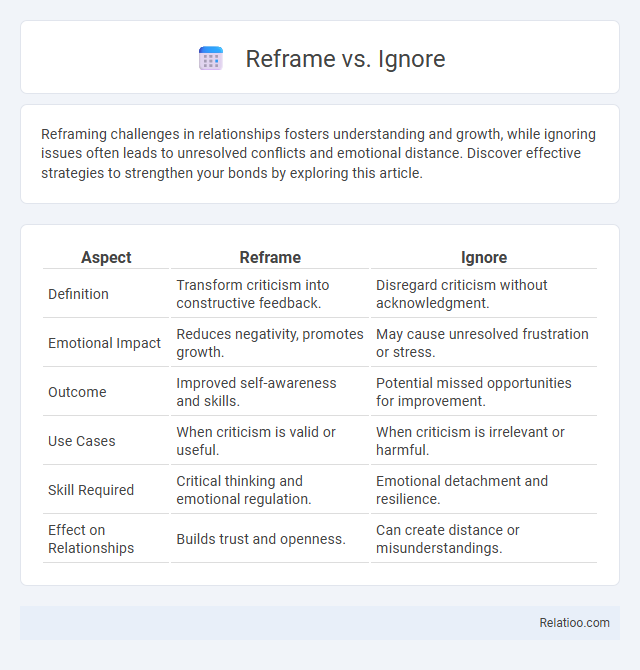Reframing challenges in relationships fosters understanding and growth, while ignoring issues often leads to unresolved conflicts and emotional distance. Discover effective strategies to strengthen your bonds by exploring this article.
Table of Comparison
| Aspect | Reframe | Ignore |
|---|---|---|
| Definition | Transform criticism into constructive feedback. | Disregard criticism without acknowledgment. |
| Emotional Impact | Reduces negativity, promotes growth. | May cause unresolved frustration or stress. |
| Outcome | Improved self-awareness and skills. | Potential missed opportunities for improvement. |
| Use Cases | When criticism is valid or useful. | When criticism is irrelevant or harmful. |
| Skill Required | Critical thinking and emotional regulation. | Emotional detachment and resilience. |
| Effect on Relationships | Builds trust and openness. | Can create distance or misunderstandings. |
Understanding the Concepts: Reframe vs Ignore
Reframe involves altering the perception of a situation to find positive or constructive meaning, enhancing cognitive flexibility and emotional resilience. Ignore means consciously choosing not to acknowledge or respond to certain stimuli or information, often as a way to reduce stress or distraction but potentially risking unaddressed issues. Understanding the difference between reframe and ignore is crucial for effective emotional regulation and decision-making strategies in psychological and behavioral contexts.
Psychological Foundations of Reframing
Reframing, a core psychological technique, involves altering the perception of a situation to change its meaning and emotional impact, thereby fostering cognitive flexibility and resilience. Ignoring, in contrast, may lead to avoidance behaviors and hinder emotional processing, while repetition without reframing often reinforces negative thought patterns. The psychological foundation of reframing lies in cognitive-behavioral therapy principles, emphasizing the restructuring of maladaptive thoughts to enhance mental well-being and adaptive coping strategies.
The Impact of Ignoring on Emotional Health
Ignoring emotional challenges can lead to increased stress, anxiety, and unresolved feelings that negatively impact your overall emotional health. The avoidance of confronting emotions often results in a buildup of tension and a diminished ability to cope with future stressors. Developing strategies like reframing allows you to process emotions constructively, promoting resilience and emotional wellbeing.
When to Reframe Challenging Situations
When to reframe challenging situations depends on your ability to shift perspective and find constructive meaning in adversity. Reframing transforms negative thoughts into opportunities for growth, while ignoring may lead to unresolved emotions and missed lessons. You benefit most from reframing when stress feels overwhelming, enabling resilience and proactive problem-solving.
When Ignoring Becomes a Useful Strategy
Ignoring becomes a useful strategy when emotional reactions hinder rational decision-making or escalate conflicts, allowing you to maintain composure and focus on solutions. Reframing shifts perspectives by altering the meaning of a situation, fostering resilience and positive outlooks, while repeating helps reinforce adaptive thoughts through consistent practice. Choosing when to ignore versus reframe depends on emotional intensity, context, and your goal to regulate stress effectively without suppressing important feelings.
Cognitive Benefits of Reframing
Reframing enhances cognitive flexibility by enabling individuals to reinterpret situations, reducing negative emotional impact and promoting adaptive problem-solving. Unlike ignoring, which may suppress awareness and delay resolution, reframing actively engages cognitive processes to create new perspectives and foster resilience. This mental shift supports improved emotional regulation, decision-making, and overall psychological well-being.
Potential Risks of Habitual Ignoring
Habitually ignoring issues can lead to unresolved emotional stress, deteriorating mental health, and strained relationships, which may negatively impact your overall well-being. Ignoring problems often bypasses necessary reflection and constructive change, causing the underlying causes to persist or worsen over time. Reframing challenges promotes healthier coping mechanisms by encouraging perspective shifts that foster growth and resilience rather than avoidance.
Practical Techniques for Reframing
Practical techniques for reframing include identifying negative thoughts, challenging their validity, and replacing them with positive or neutral perspectives to shift mindset. Unlike ignoring problems, reframing actively transforms perception, leading to constructive emotional responses and problem-solving approaches. Implementing cognitive restructuring exercises, such as thought journaling and perspective-taking, helps reinforce adaptive thinking patterns essential for mental resilience and personal growth.
Signs You Shouldn’t Ignore a Problem
Ignoring problems can lead to escalating stress, decreased productivity, and long-term mental health issues, signaling the need for immediate attention. Reframing challenges allows for new perspectives and problem-solving strategies, but persistent signs such as chronic anxiety, physical symptoms, or recurring conflicts indicate that ignoring the issue is detrimental. Recognizing these warning signs and choosing to reframe rather than ignore promotes resilience and effective resolution in both personal and professional contexts.
Choosing the Right Approach: Reframe or Ignore
Choosing the right approach between Reframe and Ignore depends on the nature of the challenge you face and your desired outcome. Reframing transforms negative thoughts into empowering perspectives, enhancing your emotional resilience and problem-solving abilities. Ignoring, by contrast, involves consciously dismissing distractions or unproductive criticisms to preserve your focus and mental clarity.

Infographic: Reframe vs Ignore
 relatioo.com
relatioo.com